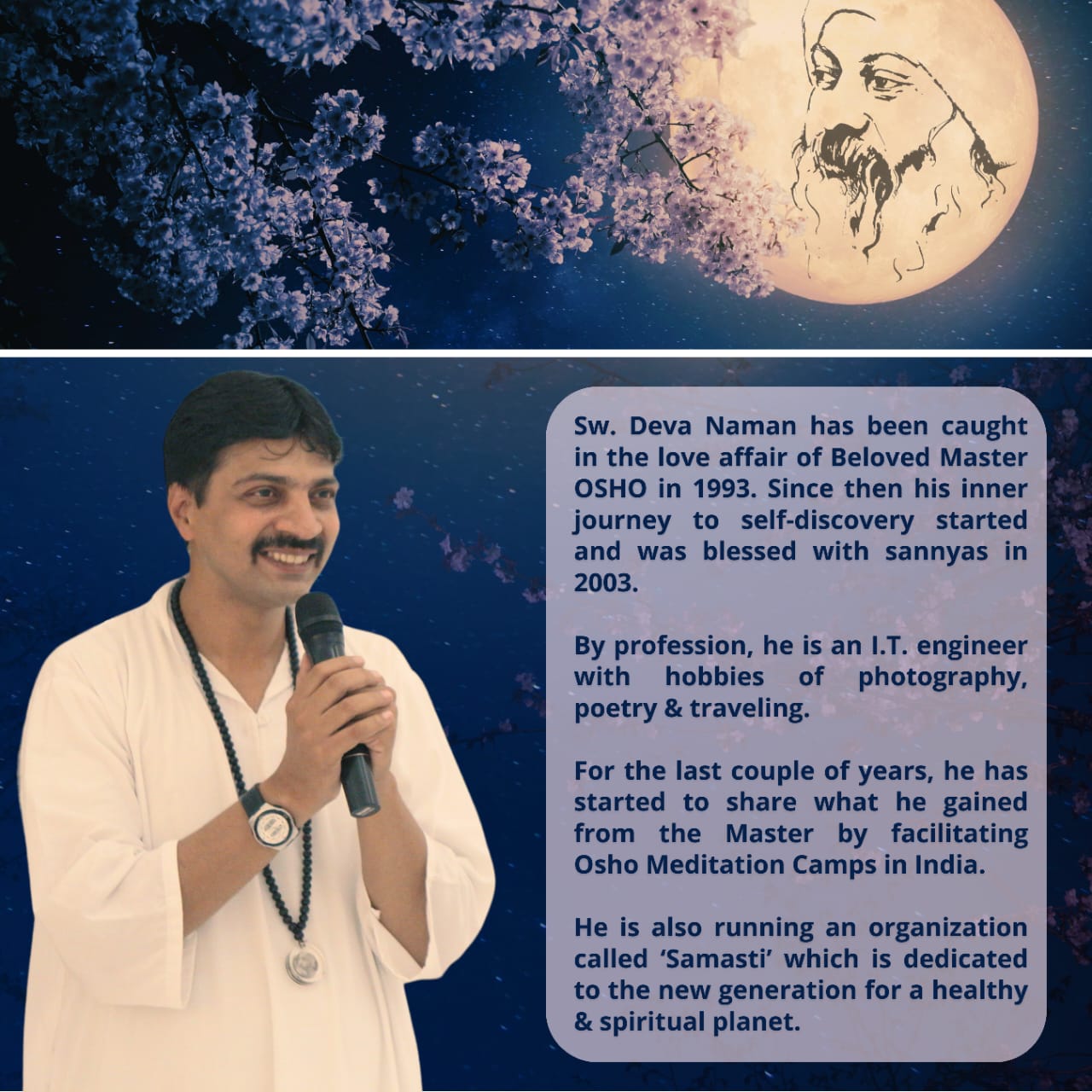Guru Purnima
Guru Purnima is a Hindu festival celebrated every year on the full moon day in the Hindu month of Ashadha (June-July). It is a day dedicated to showing gratitude and paying respect to one’s spiritual and academic teachers or gurus.
It is believed that on this day, Lord Shiva became the first guru or Adiyogi, who imparted his knowledge to seven sages or Saptarishis. Devotees on this day offer puja, chant mantras, and seek blessings from their gurus.
The festival is not only limited to Hinduism but celebrated across India as well as in other countries like Nepal and Bhutan. It is a reminder to all that the presence of a guru in one’s life is an important aspect of spiritual and personal growth.



Facilitated by Swami Deva Naman at Osho Nisarga – Himachal Pradesh
Guru Purnima 2023: Honoring the Divine Teachers and Embracing Spiritual Enlightenment
Get ready to immerse yourself in the blissful celebration of Guru Purnima 2023, a day dedicated to honoring our divine teachers and embracing spiritual enlightenment. As the full moon graces the sky, devotees across the globe come together to express their gratitude towards the enlightened souls who have illuminated their path towards self-realization. Guru Purnima is not just a day of reverence, but a profound reminder of the invaluable role that spiritual teachers play in our lives. It is a time to reflect on the teachings we have received, the wisdom we have gained, and the transformative power of the guru-disciple relationship. Join the millions of seekers who gather on this auspicious occasion to seek blessings, offer gratitude, and deepen their spiritual journey. From ancient scriptures to modern spiritual practices, Guru Purnima serves as a catalyst for self-reflection, inner growth, and the cultivation of a deeper connection with the divine. Let us come together as a global spiritual community to celebrate the wisdom, guidance, and love bestowed upon us by our gurus, and embark on a path towards inner illumination.
What is Guru Purnima?
Guru Purnima, also known as Vyasa Purnima, is a sacred day celebrated by Hindus, Buddhists, and Jains to honor their spiritual teachers. The word “Guru” refers to a spiritual guide or mentor, and “Purnima” signifies the full moon day. It falls on the Hindu month of Ashadha (June/July) and holds immense significance in the spiritual calendar.
Guru Purnima is a time to pay homage to the gurus who have selflessly shared their wisdom and guided seekers on their spiritual path. It is believed that on this day, the divine energies are at their peak, making it an opportune time to receive blessings and spiritual upliftment.
The origins of Guru Purnima can be traced back to ancient times when the sage Vyasa, who is considered one of the greatest gurus in Hindu mythology, was born. Vyasa is revered as the author of the epic Mahabharata and is considered the epitome of knowledge and wisdom. His birth anniversary is celebrated as Guru Purnima, highlighting the importance of the guru-disciple relationship in the pursuit of spiritual enlightenment.
The Significance of Guru Purnima in Hinduism
In Hinduism, the guru holds a revered position as the one who dispels darkness and leads the disciple towards enlightenment. Guru Purnima is a day to express gratitude, seek blessings, and honor the spiritual teachers who have selflessly dedicated their lives to the upliftment of humanity.
On this auspicious day, disciples gather at the feet of their gurus to offer their reverence and perform various rituals. It is believed that the blessings received on Guru Purnima have the power to transform lives and pave the way for spiritual growth.
The significance of Guru Purnima extends beyond the realm of traditional rituals. It serves as a reminder of the eternal bond between the guru and disciple, emphasizing the importance of humility, surrender, and the quest for knowledge. The teachings imparted by the guru are seen as a guiding light that dispels ignorance and leads the seeker towards self-realization.
The Story Behind Guru Purnima
The origins of Guru Purnima can be traced back to ancient Indian mythology, where the sage Vyasa played a pivotal role. Legend has it that Vyasa was not only a sage but also the compiler of the ancient Hindu scriptures, including the Vedas and the Puranas.
Vyasa was born on the day of Ashadha Purnima, and his birth marked the beginning of the Guru Purnima tradition. His immense contributions to the preservation and dissemination of knowledge earned him the title of “Adi Guru” or the first guru.
Vyasa’s teachings and wisdom continue to inspire seekers to this day. The story behind Guru Purnima serves as a reminder of the sacred bond between the guru and disciple and the eternal nature of spiritual knowledge.
Rituals and Customs Associated with Guru Purnima
Guru Purnima is a day filled with sacred rituals and customs that vary across different cultures and traditions. While the specific practices may differ, the essence remains the same – paying homage to the spiritual teachers and seeking their blessings.
One common ritual observed on Guru Purnima is the “Guru Puja,” where devotees offer prayers and perform aarti (ritual of waving a lamp) to their gurus. The puja is conducted with utmost reverence and devotion, symbolizing the disciple’s gratitude and surrender to the guru.
Another customary practice is the “Guru Dakshina,” where disciples offer a token of gratitude to their gurus. This offering can be in the form of money, clothes, or any valuable item. The act of giving is seen as a way to express appreciation and reciprocate the guru’s selfless teachings.
In addition to these rituals, devotees often engage in spiritual discourses, meditation, and chanting of mantras on Guru Purnima. These activities serve as a means to deepen one’s spiritual connection, gain knowledge, and honor the sacred occasion.
Celebrations of Guru Purnima Around the World
Guru Purnima is celebrated with great fervor and enthusiasm in various parts of the world. Regardless of cultural differences, the essence of honoring the divine teachers remains the same.
In India, the birthplace of Guru Purnima, celebrations take place in temples, ashrams, and spiritual centers. Disciples gather to listen to discourses, participate in devotional singing, and engage in acts of service as a way to express their devotion.
In Nepal, Guru Purnima is celebrated as a public holiday, and devotees flock to sacred sites and monasteries to seek blessings from their gurus. The atmosphere is filled with joy and reverence as the devotees immerse themselves in prayer and meditation.
Buddhists around the world also celebrate Guru Purnima as a significant day in their spiritual calendar. It marks the day when Gautam Buddha, the founder of Buddhism, gave his first sermon after attaining enlightenment. Buddhists pay homage to their gurus and reflect on the teachings of the Buddha.
Jains celebrate Guru Purnima by honoring their spiritual leaders, known as Tirthankaras. It is a time to reflect on the teachings of these enlightened beings and seek their guidance in leading a righteous and compassionate life.
Importance of Honoring Teachers and Seeking Spiritual Enlightenment
The significance of honoring teachers and seeking spiritual enlightenment cannot be overstated. In a world filled with distractions and material pursuits, the role of a guru becomes even more crucial in guiding seekers towards inner peace and self-realization.
A guru serves as a bridge between the seeker and the divine, imparting spiritual wisdom and guiding the disciple on their path. The guru-disciple relationship is based on trust, respect, and surrender, with the guru acting as a beacon of light in the darkness of ignorance.
By honoring our teachers, we acknowledge the invaluable role they play in our spiritual journey. Their teachings serve as a compass, pointing us towards self-discovery, inner transformation, and the realization of our true nature.
Seeking spiritual enlightenment is not a one-time event but a lifelong pursuit. Guru Purnima serves as a reminder of the importance of continuously seeking knowledge, deepening our understanding, and cultivating a spiritual practice.
The Guru-Disciple Relationship in Various Spiritual Traditions
The guru-disciple relationship is a timeless tradition that transcends cultural and religious boundaries. While the specific practices may vary, the essence remains the same – the transmission of spiritual knowledge and the awakening of the disciple’s consciousness.
In Hinduism, the guru is seen as a divine guide who leads the disciple towards self-realization. The relationship is rooted in reverence, surrender, and the guru’s ability to awaken the dormant spiritual potential within the disciple.
In Buddhism, the relationship between the teacher and student is known as the “Sangha.” The Sangha plays a vital role in guiding the practitioner on the path to enlightenment and helping them overcome obstacles and delusions.
In Sufism, the mystical branch of Islam, the guru-disciple relationship is characterized by love, devotion, and the transmission of spiritual insights. The Sufi master, known as the “Murshid,” guides the disciple towards the realization of their true self and the attainment of union with the divine.
Regardless of the spiritual tradition, the guru-disciple relationship is founded on trust, surrender, and the mutual commitment to spiritual growth. It is a relationship that goes beyond the physical presence of the guru and extends into the realm of the heart and soul.
Ways to Celebrate Guru Purnima at Home
While traditional celebrations of Guru Purnima often involve gathering at temples or ashrams, it is also possible to honor this sacred day in the comfort of your own home. Here are a few ways to celebrate Guru Purnima:
1. Create a sacred space: Set up a dedicated area in your home where you can meditate, chant mantras, and reflect on the teachings of your guru. Decorate the space with flowers, candles, and pictures of your spiritual teachers.
2. Offer gratitude: Take a moment to express your gratitude towards your gurus. Write a letter, create artwork, or simply offer your heartfelt thanks for the wisdom and guidance you have received.
3. Read spiritual texts: Spend time reading scriptures, books, or teachings from your spiritual tradition. Reflect on the profound insights and contemplate how they can be applied to your life.
4. Practice meditation: Set aside time for quiet contemplation and meditation. Allow yourself to connect with your inner self and experience the peace and stillness within.
5. Engage in acts of service: Dedicate a portion of your day to serving others. Perform acts of kindness, volunteer, or contribute to a charitable cause as a way to embody the teachings of your gurus.
Remember, the true essence of Guru Purnima lies in the intention behind your actions. Whether you celebrate in a grand gathering or in the solitude of your home, what matters is the sincerity of your devotion and the commitment to your spiritual growth.
Conclusion: Embracing the Wisdom of Our Divine Teachers on Guru Purnima
As we approach Guru Purnima 2023, let us open our hearts to the wisdom, guidance, and love bestowed upon us by our gurus. It is a time to reflect on the teachings we have received, the transformation we have undergone, and the limitless potential that lies within us.
Guru Purnima is not just a day of celebration, but an opportunity to deepen our spiritual journey, embrace self-realization, and cultivate a deeper connection with the divine. Let us honor our spiritual teachers, seek their blessings, and embark on a path towards inner illumination.
May this auspicious occasion be a reminder of the eternal bond between the guru and disciple, and may it inspire us to live a life of compassion, wisdom, and spiritual growth. As we come together as a global spiritual community, let us celebrate the wisdom, guidance, and love that have illuminated our lives, and may the light of our gurus continue to shine brightly in our hearts.


